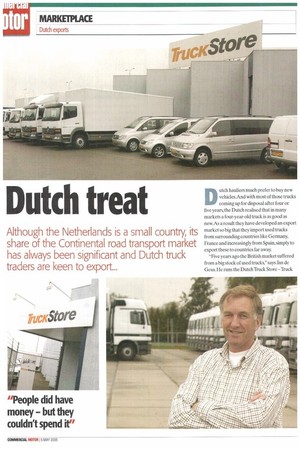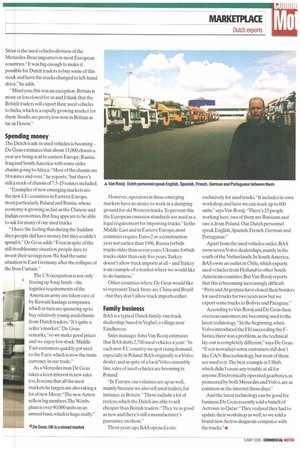Dutch treat
Page 72

Page 73

If you've noticed an error in this article please click here to report it so we can fix it.
Although the Netherlands is a small country, its share of the Continental road transport market has always been significant and Dutch truck traders are keen to export...
Dutch hauliers much prefer to buy new vehicles. And with most of those trucks coining up for disposal after four or five years, the Dutch realised that in many markets a four-year-old truck is as good as new. As a result they have developed an export market so big that they import used trucks from surrounding countries like Germany, France and increasingly from Spain, simply to export these to countries far away.
"Five years ago the British market suffered from a big stock of used trucks," says Jan de Geus. He runs the Dutch Truck Store —Truck Stor is the used vehicles division of the Mer edes-Benz importers in most European cou tries."It was big enough to make it poss hie for Dutch traders to buy some of this stoc and have the trucks changed to left-hand drive," he adds.
"Mind you, this was an exception. Britain is more or less closed for us and I think that the Britiish traders will export their used vehicles to India, which is a rapidly growing market for thern. Stocks are pretty low now in Britain as far as I know."
Spending money
The Dutch trade in used vehicles is booming — De Geus estimates that about 15,000 chassis a year are being sent to eastern Europe. Russia, Iraq and South America with some older cha4is going to Africa. "Most of the chassis are 16 tonnes and over," he reports,"but there's still a stock of chassis of 7.5-15 tonnes included.
"Examples of new emerging markets are the new EU-countries in Eastern Europe, mostl particularly Poland and Russia,whose economy is growing as fast as the Chinese and Indian economies. But Iraq appears to be able to ask for many of our used trucks.
"I have the feeling that during the Saddam days people did have money, but they couldn't spend it," De Geus adds."Even in spite of the still troublesome situation, people dare to invest their savings now. We had the same situation in East Germany after the collapse of the Iron Curtain."
The US occupation is not only freeing up Iraqi funds — the logistics requirements of the American army are taken care of by Kuwaiti haulage companies, which in turn are queueing up to buy relatively young used chassis from Dutch traders."It's quite a seller's market," De Geus remarks,"so we make good prices and we enjoy low stock. Middle East customers quickly got used to the Euro, which is now the main currency in our trade."
As a Mercedes man De Geus takes a keen interest in new sales too. It seems that all the used markets he targets are also taking a lot of new Mercs:"The new Actros sells in big numbers.The Worthplant is over 90,000 units on an annual basis,which is huge, really." However, operators in these emerging markets have no desire to work in a dumping ground for old Western trucks.To prevent this the European emission standards are used as a legal requirement for importing trucks: "In the Middle East and in Eastern Europe, most countries require Euro-2 or a construction year not earlier than 1996. Russia forbids trucks older than seven years; Ukraine forbids trucks older than only five years.Turkey doesn't allow truck imports at all — andThrkey is an example of a market where we would like to do business."
Other countries where De Geus would like to represent Truck Store are China and Brazil —but they don't allow truck imports either.
Family business BAS is a typical Dutch family-run truck dealership, based in Veghel , a village near Eindhoven.
Sales manager John Van Rooij estimates that BAS shifts 2,700 used vehicles a year: "In each new EU country we spot rising demand, especially in Poland. BAS originally is a Volvo dealer, and in spite of a local Volvo assembly line, sales of used vehicles are booming in Poland.
"In Europe our volumes are up as well, mainly because we also sell used trailers, for instance, in Britain." These include a lot of reefers, which the Dutch are able to sell cheaper than British traders: "They're as good as new and there's still a manufacturer's guarantee on them."
Three years ago BAS opened a site exclusively for used trucks. "It includes its own workshop, and here we can stock up to 600 units," says Van Rooij. "There's 25 people working here; two of them are Russians and one is from Poland. Our Dutch personnel speak English, Spanish, French, German and Portuguese."
Apart from the used vehicles outlet, BAS owns seven Volvo dealerships, mainly in the south of the Netherlands. In South America, BAS owns an outlet in Chile, which exports used vehicles from Holland to other South American countries. But Van Rooij reports that this is becoming increasingly difficult: "Peru and Argentina have closed their borders for used trucks for two years now but we export some trucks to Bolivia and Paraguay."
According to Van Rooij and De Geus their overseas customers are becoming used to the latest technology."In the beginning, when Volvo introduced the FH succeeding the FSeries, there was a problem, as the technical lay-out is completely different," says De Geus. "Even nowadays some customers still don't like CAN-Bus technology, but most of them are used to it.The best example is I-Shift, which didn't cause any trouble at all for anyone. Electronically operated gearboxes, as pioneered by both Mercedes and Volvo, are as common as the interne these days."
And the latest technology can be good for business. De Geus recently sold a bunch of Actroses to Qatar:"They realised they had to update their workshop as well, so we sold a brand new Actros diagnosis computer with the trucks." •






































































































































































































